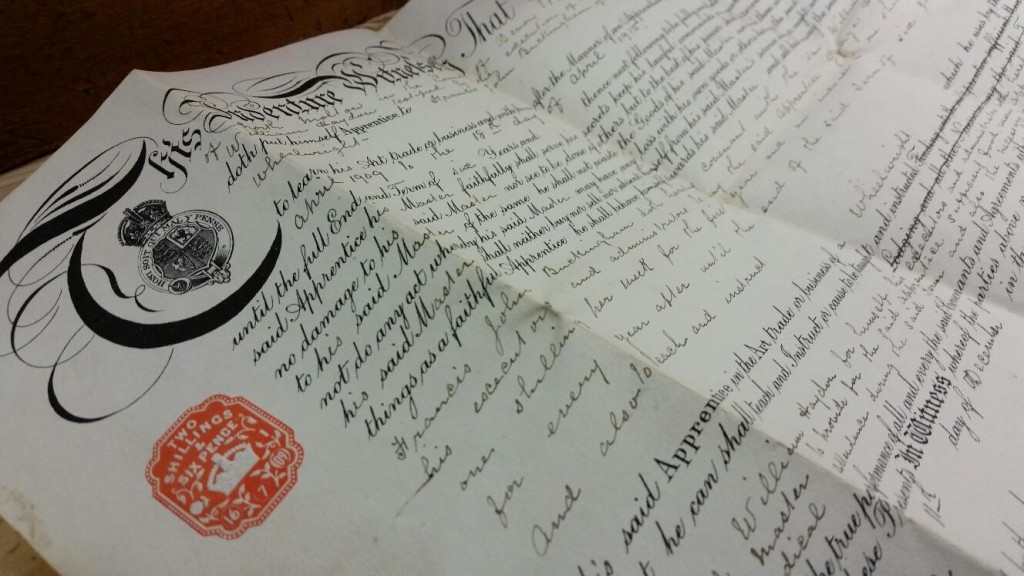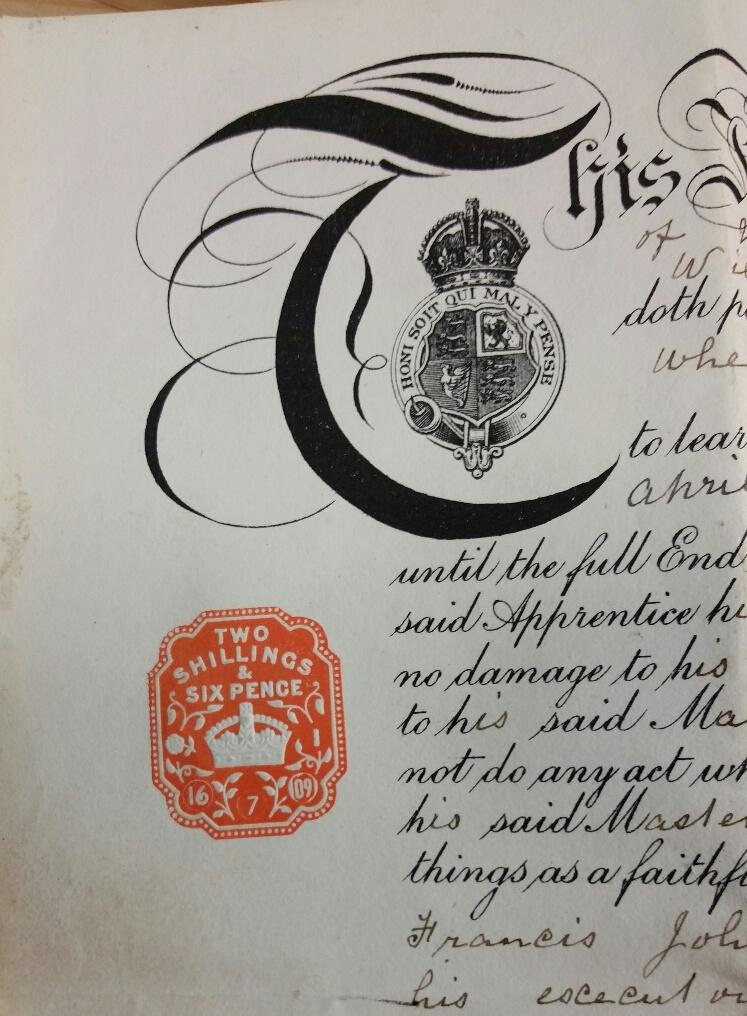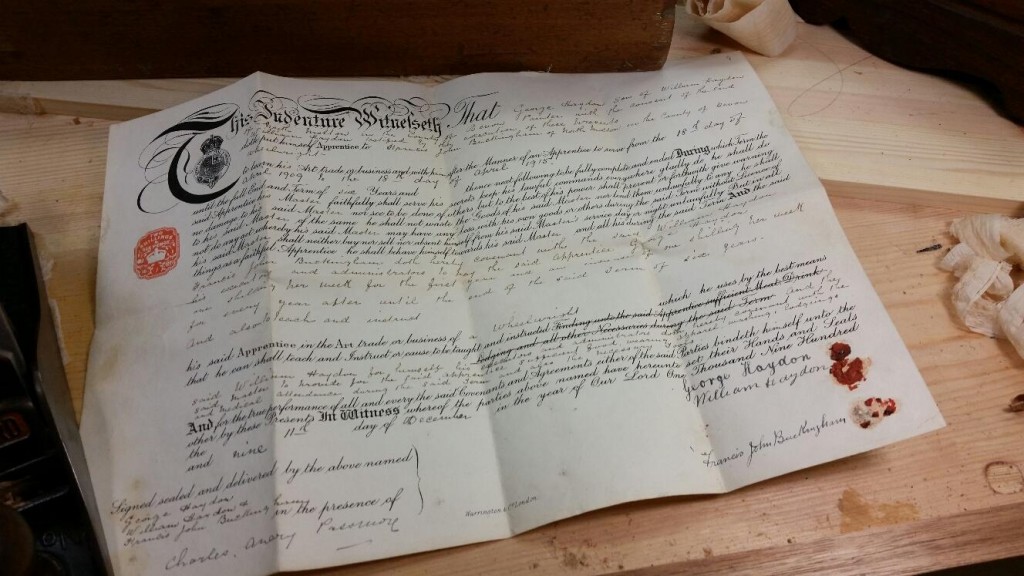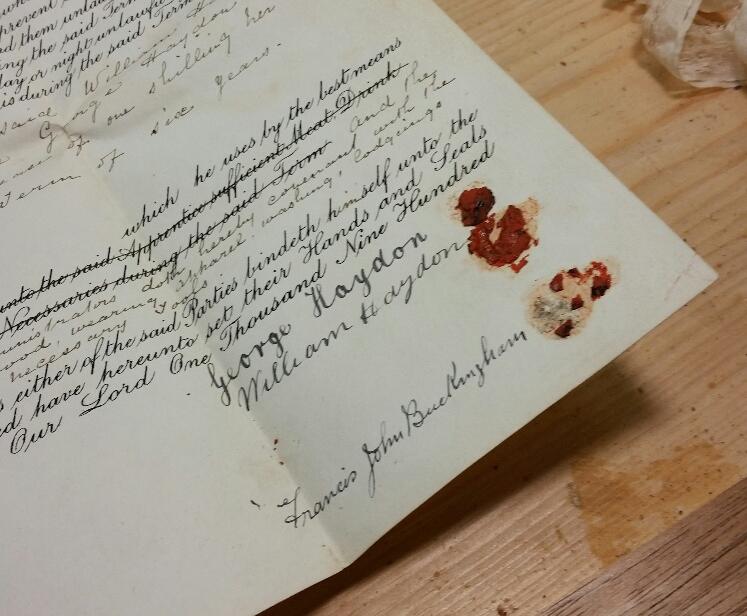We may receive a commission when you use our affiliate links. However, this does not impact our recommendations.
Utter the word “Apprentice” and perhaps for many it conjures up wistful emotions of times past, a master passing on knowledge and values consigned to history. However that most traditional sounding method of training still exists today and it’s doing rather well. I have personal experience of completing an apprenticeship and from my family’s perspective, we have throughout the last 105 years experienced the changing face of training the trades.
My great grandfather began his wheelwright apprenticeship in 1909 and his was the very traditional “indentured” apprenticeship (that’s the document you can see within this post). It was a serious document reflecting the fact the duration of training was in this case six years. Indentured apprenticeships still exist but they are less flexible and I have not personally met anyone who has completed that type.
My grandfather never completed a formal apprenticeship. My great grandfather started the business I work for now in 1926, and my Grandfather simply worked alongside him. I’m not sure why he never undertook the formal training, but I assume they both felt it unnecessary. Signing a pretty contract certainly did not prevent his becoming life long and very talented woodworker.
My father completed his carpentry & joinery apprenticeship in 1970, after the 1964 shake-up which saw a drive to bring a greater consistency to training. I have access to the trade books he used in his study. I’ll be sharing some info on them soon, as it’s pleasing to see some of the appliances discussed in the mid 20th century are no different than those used by a popular French bloke from the 18th century.
I completed my apprenticeship in 1999. At that time, there was the option of carpentry or bench joinery. I decided, whilst I had the chance, to put in a bit of extra and get both qualifications. Sadly my certificates have none of the charm of wax-sealed documents, but they are nevertheless special to me.
What is also pleasing is that there are even world events where people in the early stages of their career can compete against each other. Last year one of our team was lucky enough to represent the UK in World Skills Americas as a guest competitor. And while the trade of cabinet maker has become less part of the picture, bench joinery still offers a great way for the next generation to access traditional skills. There is more than one or two famous woodworkers who completed joinery apprenticeships, the most obvious being Thomas Chippendale.
So while the face of training has changed a great deal over time, the talent of the next generation is still there and being encouraged and inspired. Couple that with passionate and skilled enthusiasts around the world writing, making and teaching, woodworking skills should be with us for a long time to come.
As a little extra I’ve transcribed the text within the document shown here to give you a flavour of the time when it was signed.
This Indenture Witnesses That George Haydon, Son of William Haydon of North Molton in the County of Devon with the consent of the said William Haydon testified by the execution of these Indentures doth put himself Apprentice to Francis John Buckingham of North Molton in the County of Devon Wheelwright, to learn his Art trade or business and with him after the Manner of an Apprentice to serve from the 18th day of April 1909 to the 18th day of April 1915
Until the full end and term of six years thence next following to be fully complete and ended. During which term the said apprentice to his Master shall he faithfully serve his secrets, keep his lawful commands everywhere gladly, he shall do no damage to his said Master nor see to be done of others but to the best of his power shall prevent or forthwith give warning to his said Master of the same. He shall not waste the goods of his said Master nor lend them unlawfully to any. He shall not do any act whereby his said Master may have any loss with his own goods or others during the said term. Without licence of his said master he shall neither buy not sell nor absent himself from his said Master’s service day or night unlawfully but in all things as a faithful apprentice he shall behave himself towards his said Master and all his during the said term.
And the said Francis John Buckingham doth hereby covenant with the said William Haydon his executor and administrators to pay the said apprentice George Haydon one shilling per week for the first year and an increase of one shilling per week for every year after until the end of the said term of six years.
And also to teach and instruct his said apprentice in the art trade or business of a wheelwright which he uses by the best means that he can, shall teach and instruct or cause to be taught and instructed.
And the said William Haydon for himself executor and administrator doth hereby covenant with the said master to provide for the said apprentice sufficient food, wearing apparel, washing, lodgings and medical allowances during the said term and also the necessary tools.
And for the true performance of all and every the said covenants and agreements either of the said parties bindeth himself unto the other these presents in witness whereof the parties above named have hereunto set their hands and seals the 11th day of December in the year of Our Lord One Thousand Nine Hundred and Nine.”
Here are some supplies and tools we find essential in our everyday work around the shop. We may receive a commission from sales referred by our links; however, we have carefully selected these products for their usefulness and quality.













Trade apprenticeships still exist, but they’re a bit different than the traditional ones. I’m retired now, for almost 6 months, but back in 1973 I was accepted into the Pipefitters apprenticeship in Chicago. That took just over 4 years to complete. Originally, it was 5 years, it changed to 4, recently I think it changed back to 5 years.
The electricians in the area still have an apprenticeship program as well. The plumbers do as well, and the boilermakers. I guess it depends on where you are.
Being a history buff, I was proud to go through the process, knowing how many did it before me. Although we weren’t apprenticed to one journeyman, but to a mechanical contractor. We weren’t allowed to find our own work until we were journeymen which makes sense.
And there was a six month period in which you were on trial. If during that time you didn’t work out, you were released from the program.
I’m not sure if any trades in America have a formal apprenticeship. I know that union carpenters and electricians go through an apprentice period, which includes schooling. To become a code certified electrician, I had to have at least 900 hours of school and had to pass the ICC code exam. We are supposed to take the exam every 3 years but I haven’t take in since 2008 because I no longer am in a situation where I need to pull electrical permits. In any event, there were no contracts signed, just a “handshake” arraignment.
Hi terrynjon
I wish George was about to respond to that question. It does seem a logical thing to do, it’s quite a commitment from both parties. These days we typically have a couple weeks work experience and then a 3 Month trial. Thanks for the comment.
Cheers
G
I find it interesting they did not execute the contract until about eight months after it started. Did this allow the apprentice and master time to determine whether they could work together?
Jon